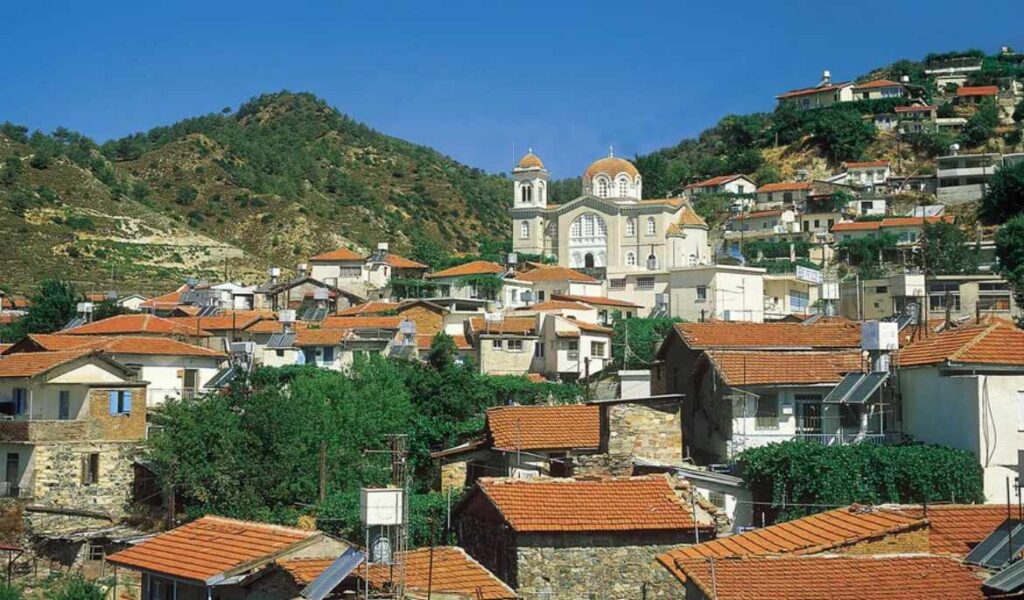The renovation of the historic Berengaria Hotel in Prodromos is sparking renewed investor interest in Cyprus’ mountain communities, with developers now turning their focus to Platres, Agros and Kakopetria.
Speaking to newspaper Politis, the president of the Pasyxe Mountain Resorts Committee, Andreas Mandalas, said that the ongoing renovation of the landmark Berengaria Hotel has become a magnet for fresh investment, particularly in the popular villages of Platres and Kakopetria.
“There is great investment interest,” he said.
“Forest Park and Penteli in Platres were sold, Petit Palais was renovated, Nea Elvetia is being renovated, and now investors are turning to Kakopetria, seeing a complete tourist destination.”
The Berengaria project is being developed by BBF, a real estate company focusing on residential and commercial properties, while its management will be handled by Thanos Hotels.
Project manager Andronikos Spyrou told Politis that the company sees strong potential in the wider Prodromos area.
“The company has made a major investment in Berengaria and planning applications have already been submitted for other developments in the area,” he said.
Investor interest has also reached Agros, where the historic Rodon Hotel has changed hands. Following a public takeover bid, Hong Kong investor Balram Chainrai now owns 87.85 per cent of the hotel.
According to Mandalas, there is growing interest from Israeli, Russian and local investors, with the state offering support through grants and renovation schemes.
He also stressed that government involvement has been key in facilitating momentum. “The government is supportive of our efforts, either with funds or renovations,” he noted.
In Kakopetria, local authorities are actively seeking to attract capital. Community council president Iakovos Papaphilippou confirmed that land and homes are being bought in the area, while discussions are under way to revive inactive hotel properties.
“We will try to find investors for hotels that are no longer operating and for which there is no interest from the owners’ heirs,” he said.
Papaphilippou also pointed to improved accessibility as a driver for future growth. “The road from Astromeritis to Evrychou is being completed this year, and as promised, the road from Kokkinotrimithia to Astromeritis will be completed in 2029,” he said.
“These projects will open up the region and create more investment opportunities.”
In Pano Platres, secretary community council, Dimitris Papatheodotou reported high demand for land and ongoing projects worth over €100 million.
“Investors must be supported by the state so that there are no delays in issuing building permits and dividing land,” he said.
“By having interest, our forest land is protected rather than being abandoned.”
He added that while tourism is the key engine of growth, more is needed to make the villages liveable year-round.
“We’re calling for improved infrastructure, an upgraded Limassol–Platres road, and better schools, daycare centres and kindergartens to help women and workers,” he said.
These developments are being reinforced by the government’s broader mountain community development strategy, which aims to revitalise remote areas and improve quality of life.
According to a note prepared by the mountain development commissioner, a total of 280 government actions and policies are currently being implemented in mountain areas, ranging from infrastructure upgrades to education and healthcare.
The Ministry of Transport continues roadworks to ensure faster and safer access, while the Ministries of Health and Education are strengthening services across the region.
Improvements are also under way in the fields of agriculture, waste management, fire prevention and environmental protection.
According to the commissioner, government funding is helping lay the foundation, but it is private investment that is driving real momentum.
“Quality tourist units, small family businesses, wineries, traditional accommodations and agrotourism activities are developing, creating new jobs and strengthening the local economy,” the note said.
Efforts to support young people and families are also seen as crucial to reversing urban sprawl.
“Supporting youth entrepreneurship and creating opportunities for young people is a key objective,” it added,
It also mentioned that the aim is to “curb the migration to cities and ensure the sustainable revitalisation of mountain communities.”
“Rural Cyprus has unique natural and cultural wealth, which can be harnessed to develop sustainable tourism and strengthen local production,” the commissioner said.
“With hard work and cooperation, these areas can become models of sustainable development, offering both a high quality of life for residents and unforgettable experiences for visitors” he concluded.



